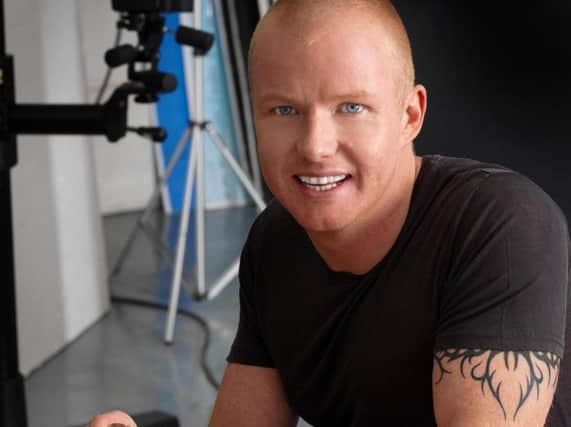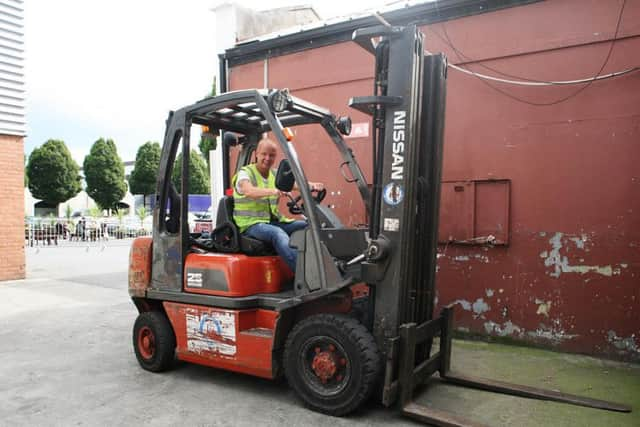'At school I was just classed as thick' - Beauty expert Leighton Denny says children with dyslexia need more support


Leighton Denny was excluded from school at 15, leaving compulsory education without a single qualification to his name.
He didn’t know it then but he was one of around 10 per cent of the UK population that has dyslexia, a learning difficulty that can cause problems with reading, writing and spelling.


Advertisement
Hide AdAdvertisement
Hide Ad“When I was at school, dyslexia wasn’t recognised,” the 45-year-old from East Bierley, Bradford says. “I was just classed as thick. I wanted to learn but I couldn’t. I couldn’t get my head around the way they were teaching me. My head works differently. I’ve got more of a creative approach to things and textbook education isn’t very creative so I lost interest in things fast.
“A teacher once told me at school, you’re going to end up in the gutter or prison and that always stuck with me – I didn’t want either. But I did go off the rails a bit when I left because I had no qualifications. I was still learning to read and write properly from a private tutor my parents had got me.”
Leighton, who started out as a forklift truck driver, is now one of the UK’s top nail and beauty experts, his star-studded client list featuring Kate Moss, Penelope Cruz and Adele. He built an empire of salons across the world, produced his own line of nail and beauty treatments and in 2015, was awarded an MBE by the Queen for his services to business.
“I was lucky,” he says. “I got through because I had parents that were not going to let me fail. They got night jobs to pay for my home tutor. They worked with me. My mum and dad identified when I was young that I was struggling with reading and writing so they’d get me toys for Christmas focused on those things to help me develop.”
Advertisement
Hide AdAdvertisement
Hide AdLeighton, who was diagnosed with dyslexia at the age of 17, has now become an ambassador for the British Dyslexia Association. With the national charity, he is working to raise awareness, improve diagnosis and increase support for young people with the condition.
Dyslexia is still often poorly understood and the association says diagnosis and support is at its worst since the government first began funding services in the 1980s.
In October, the All-Party Parliamentary Group for Dyslexia and Other Specific Learning Differences published a report into the educational cost of the condition.
Diagnosis is rarely an option for those who cannot afford to pay privately, it said, with more than 80 per cent of children with dyslexia leaving school without a one. Support is also “inadequate or nonexistent”, it continued, with many parents having to fight for months for basic help.
Advertisement
Hide AdAdvertisement
Hide AdOne of the report’s key proposals is to have a specialist dyslexia teacher in every school, to diagnose and support young people. It is one Leighton says is urgently needed, to stop children “slipping through the net”.
“Schools are up against it with budgets and what I’ve found is that parents are finding it hard for schools to address their child is dyslexic because they haven’t got the budget and so they’re putting barriers up.
“Families that I’ve met or that have shared their stories with me on social media are saying they just can’t get the basic diagnosis and support needs from school. They are having to fight.
“I’ve even had some people say that schools have rejected the child when the parents have paid themselves for a dyslexia diagnosis because they haven’t got specialist teachers to offer support. Everybody should have a chance in life to get an education.”
Advertisement
Hide AdAdvertisement
Hide Ad“I feel privileged that I have broken through barriers, which was hard to do,” he adds. “Things have changed so much since I was at school and technology has advanced. There is no need for children to be going through what I went through.
“If we can get the Government to accept that every school needs a dyslexia trained teacher as standard or if I can raise awareness and help out at least one child, then I’m going to be happy.”
Leighton, who is working on his second book and plans to include more about his experience with dyslexia within it, says some days he struggles to read and write, and uses software for support.
“When I’m tired or I’m distracted, the dyslexia comes in and really affects me still. It still frustrates me today at 45-years-old... Sometimes when I can’t spell things, it makes me feel daft. It takes me back to that feeling of sitting in school and a teacher telling me I’m thick.”
Advertisement
Hide AdAdvertisement
Hide AdHis message for others with the condition is to focus on what they’re good at and look at dyslexia as their biggest asset. He sees it as a gift. “I have no doubt I wouldn’t be where I am today without my dyslexic thinking,” he says. “I find I can see things more clearly and perhaps less traditionally than other people – I say I ‘think out of the bottle’.”
Leighton’s latest achievement is winning Entrepreneur of the Year in the British Association of Beauty Therapy & Cosmetology Awards. “Sometimes I have to pinch myself,” he says. “I work really hard, it doesn’t just come to me – you get out of life what you put in.
“But I do pinch myself sometimes because I think wow, this (success) has continued now for 20 years, I’ve been winning awards for 20 years. And I really do believe that it is my dyslexia that sets me apart from everybody else because of the way I think. I’m more creative, I’m a really good communicator.
“Winning entrepreneur of the year with such a prestigious company just came out of nowhere and I’m proud as punch really. That also makes me want to do what I’m doing. I want to give back.”
For more information on dyslexia, and to access a new support pack for parents, visit www.bdadyslexia.org.uk